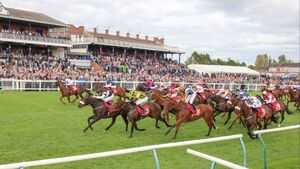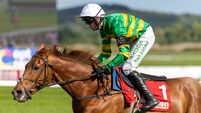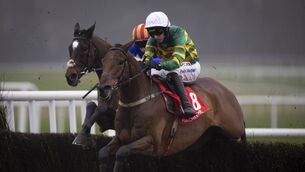Speed merchants race at Ayr Gold Cup

Ayr Gold Cup 2024
Recently Ayr racecourse staged the highlight of the Scottish flat season – The Ayr Gold Cup. A sprint handicap over a straight six furlongs, the Ayr Gold Cup was first run in 1804. It was won by Chancellor, owned by Lord Cassillis, as it was the following year. Only when racing shifted to the present course in 1908 did the Ayr Gold Cup become a sprint race.
‘Horse Racing Records’, published in 1993, adds colour to the event. ‘As the noted historian on Northern and Scottish affairs, John Fairfax-Blakeborough rightly pointed out, what the St Leger means to Yorkshire and the Northumberland Plate means to what used to be Northumberland, the Ayr Gold Cup means to Scotland. ..
‘Perhaps the most notable event between the wars was the 1936 race, when Albert ‘Midge’ Richardson, a superb lightweight jockey, weighed out at 6st 13lb to win on Marmaduke Jinks. It was the lowest weight carried to victory since the race was run over six furlongs, and Richardson was not an apprentice, but a fully-fledged jockey aged forty-two.’ ‘Nowadays the field tends to lack quality, but five recent winners stand out. Be Friendly, winner of the inaugural G1 Haydock Sprint Cup, added the Ayr Gold Cup under 8st 9lb from thirty-two opponents in 1967 and in 1973 Blue Cashmere won before going on to prove to be a top-class sprinter in the following season’s Nunthorpe and the Temple Stakes. Roman Warrior set a weight-carrying record in 1975 when getting up by a short head to beat Import and dead-heating with Swingtime for the Diadem Stakes at Ascot six days later, while the three-year-old Vaguely Great won under 9st 6lb in 1978. In 1992, Lochsong, carrying 9st completed an historic treble in the Stewards’ Cup, the Portland Handicap and the Ayr gold Cup, a feat which may well never be repeated.’ Something equally remarkable happened in this year’s renewal. Karl Burke, who trains in Spigot Lodge, Middleham, had three representatives in the field of twenty-five. They finished first, second and third. Lethal Levi, blinkered for the first time and ridden by Clifford Lee, won by all of three lengths from Silky Wilkie (Sam Fielden) and Korker (Jason Hart). Moreover, he did so at 20-to-1. Back in 1998 Karl Burke had saddled first and second. Now he completed the clean sweep. Daring Destiny had put Karl on the map when successful’ in the race in 1994.
What about all the Irish-trained winners of Scotland’s most prized Flat race, you ask. Er, there have not been any. Well, we can make one qualified exception – Soldennis, back in 1922. Normally resident in Blakes’ of the Heath stable, Soldennis was quartered with Lord George Dundas in Newmarket for his Scottish raid.
As a two-year-old this chestnut son of Tredennis was trained on Maryborough Heath by ‘Shem’ Jeffrey, private trainer to the Blakes and their friends. From four starts he ended that campaign on a winning note, successful in the National Produce Stakes in the hands of Clyde Aylin for County Antrim owner Charles Mackean. Kept busy as a three-year-old, Soldennis six of his ten starts, notably the inaugural Irish Two Thousand Guineas, ridden by Tommy ‘Scotchman’ Burns. His winning swansong in the Irish Breeders’ Champion Sweepstakes at the Curragh in November ensured his title as the Horse of the Year, 1921.
Successful in the April Stakes at the Curragh on his 1922 debut, Soldennis followed up with a Phoenix Park win on his way to Newmarket. A close second in the Portland Plate at Doncaster left him on song for the Ayr Gold Cup. And so it proved. Sent off even money favourite under Charlie Elliott, he recovered from a slow start to win by a neck and a head.
Back home Soldennis won five of his eleven starts in 1923, all of them at the Curragh, credited successively to George Dundas, Tom Coombs and ‘Shem’ Jeffrey. Not allowed to rest on his laurels, Soldennis was called upon to race for a fifth campaign in 1924, amounting to fourteen starts, yielding a further eight wins. Successes at Ayr, the Curragh (6) and the inaugural meeting at Mallow (Cork today), and the season’s finale at Manchester in November. That brought his tally to twenty-four. Retired to stand at Isidore Blake’s Heath Stud, he sired Solenoid, winner of the National Produce Stakes, the Ayr Gold Cup and the Stewards’ Cup at Goodwood and the Cork and Orrery Stakes at Ascot before succeeding his sire at Heath Stud.





